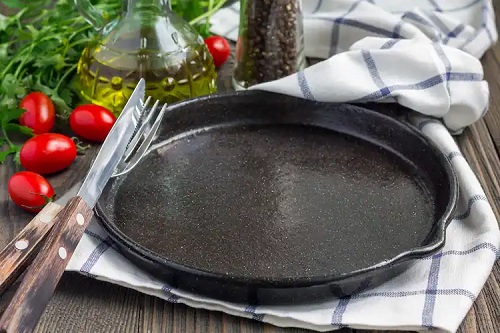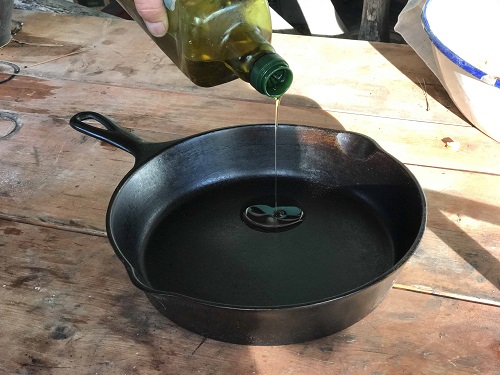Seasoning Cast Iron with Olive Oil will ensure your cookware lasts long and enhances your culinary experience to the next level!
Before Teflon pans became popular, ancestors cooked in durable cast iron cookware. Renowned for its longevity and even heat distribution, the key to cast iron’s efficiency is seasoning, which turns its surface into a non-stick culinary canvas. Learn everything about Seasoning Cast Iron with Olive Oil in this informative guide below!
Pick the Best Oils for Seasoning Your Cast Iron Cookware here
Why Season Cast Iron?
Seasoning is more than just applying oil to your skillet. When oil is heated on cast iron, it undergoes a process called polymerization. The fatty acids in the oil react with the iron to form a hard, plastic-like substance that bonds to the pan’s surface. This layer is both protective and non-stick, making it suitable for various culinary uses.
Can You Season Cast Iron with Olive Oil?
Olive oil, the golden nectar of the Mediterranean, has been praised for its taste and health benefits. But Can You Season Cast Iron with Olive Oil? Let’s learn below:
1. High Smoke Points
The smoke point is critical for seasoning as it determines how well an oil can withstand heat without breaking down. While extra virgin olive oil has a lower smoke point, refined or “light” olive oils have smoke points around 465°F, making them ideal for the seasoning process.
2. Nutritional and Health Benefits
Olive oil contains monounsaturated fats known to reduce bad cholesterol levels, promoting cardiovascular health.
The presence of vitamin E and polyphenols not only provides health benefits but can also contribute to a longer-lasting seasoning layer that protects cast iron.
3. Enhanced Cooking Experience
Olive oil can infuse cast iron with a Mediterranean aroma, enriching the taste of dishes cooked on it.
Olive oil seasoning results in a non-toxic, natural non-stick layer that simplifies both cooking and cleaning.
4. Eco-Friendly Choice
Olive oil, being pure, doesn’t contain any harmful additives or synthetics. Also, olive oil is biodegradable, so its seasoning doesn’t release harmful chemicals, making it a sustainable choice for the environment.
5. Practicality and Tradition
Most kitchens already stock olive oil, eliminating the need for a separate purchase. Using olive oil for both cooking and seasoning is cost-effective. Olive oil’s long-standing culinary significance in many traditions can make its use resonate more deeply.
Beyond cast iron, olive oil is equally effective for seasoning other cookware, like carbon steel pans.
How to Season Cast Iron with Olive Oil?
Learning How to Season Cast Iron with Olive Oil is important to reap the maximum benefits of this process. Here are the steps to follow:
1. Preparation Phase
- For new skillets, wash them with warm, soapy water to remove any protective coatings. For older pans, scrub off any rust or old food residues using coarse salt and a sponge.
- Dry the skillet thoroughly using a cloth or place it on the stovetop over low heat to ensure all moisture is evaporated.
2. Application of Olive Oil
- If you’re determined to use olive oil, opt for refined versions. Their higher smoke point is more forgiving during the seasoning process.
- Using a lint-free cloth, apply a thin, even layer of the oil to the entire skillet, including the exterior and handle.
3. Baking Phase
- Preheat your oven to 450°F to 500°F. The aim is to exceed the smoke point to facilitate polymerization.
- Place the skillet upside-down in the oven to allow any excess oil to drip off. For an added precaution, put a baking sheet or aluminum foil below to catch any drips.
- Let it bake for one hour. The skillet should emerge with a shiny, semi-glossy finish.
4. Cooling and Storing
- After baking, turn off the oven and let the skillet cool inside to room temperature. This slow cooling helps in the seasoning process.
- Place a paper towel inside the skillet to absorb any moisture and prevent rust.
Maintenance and Care
Seasoned cast iron can last generations, but it requires care:
- Avoid acidic foods, like tomatoes, which can break down the seasoning.
- Hand wash with minimal soap and avoid the dishwasher.
- Regularly re-season your skillet, especially if it starts looking dull or if food sticks.
Key Takeaways
Seasoning Cast Iron with Olive Oil, especially refined versions, can be a healthy and effective way to maintain the glory of your cast iron cookware. With proper care, your skillet will not only be a tool but also an heirloom, carrying stories and flavors from one generation to the next.



